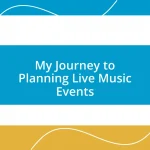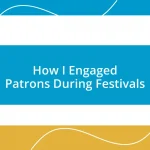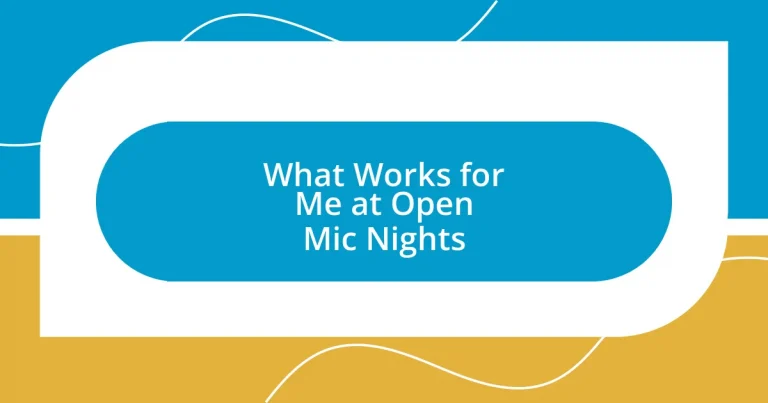Key takeaways:
- Open mic nights foster a supportive environment for both seasoned and new performers, serving as a platform for personal expression and community connection.
- Preparation is crucial; practice, selecting relatable material, and visualization techniques can enhance performance confidence and audience engagement.
- Building connections with other performers and seeking constructive feedback post-performance are essential for continuous improvement and growth in one’s artistic journey.
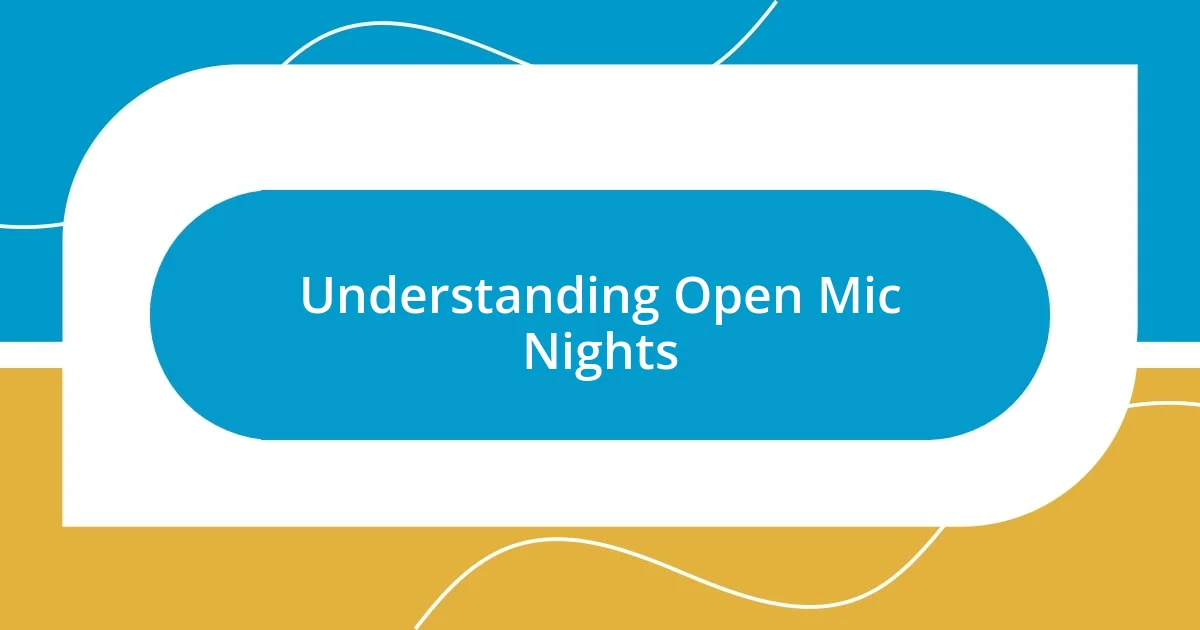
Understanding Open Mic Nights
Open mic nights are vibrant community events where performers of all levels showcase their talents, and I can assure you that the energy in the room is often palpable. I remember my first experience stumbling onto the stage; my heart raced as I faced a crowd of supportive strangers. It’s a unique space where vulnerability meets artistry, and that mix becomes contagious.
What I find fascinating is how open mic nights serve as an incubator for creativity. It’s a platform where seasoned artists and newcomers alike can share their work, often leading to unexpected connections. Have you ever thought about the stories behind the performances? Each act can range from a heartfelt poem to a catchy song, revealing the myriad experiences of our shared humanity.
As I sat in the audience one night, I couldn’t help but feel inspired by the diverse range of talents. Some performers brought laughter, while others stirred deep emotions. Isn’t it incredible how just a few minutes on stage can open up a world of feelings and thoughts? Open mic nights offer a chance for personal expression and community bonding that, in my experience, is truly irreplaceable.
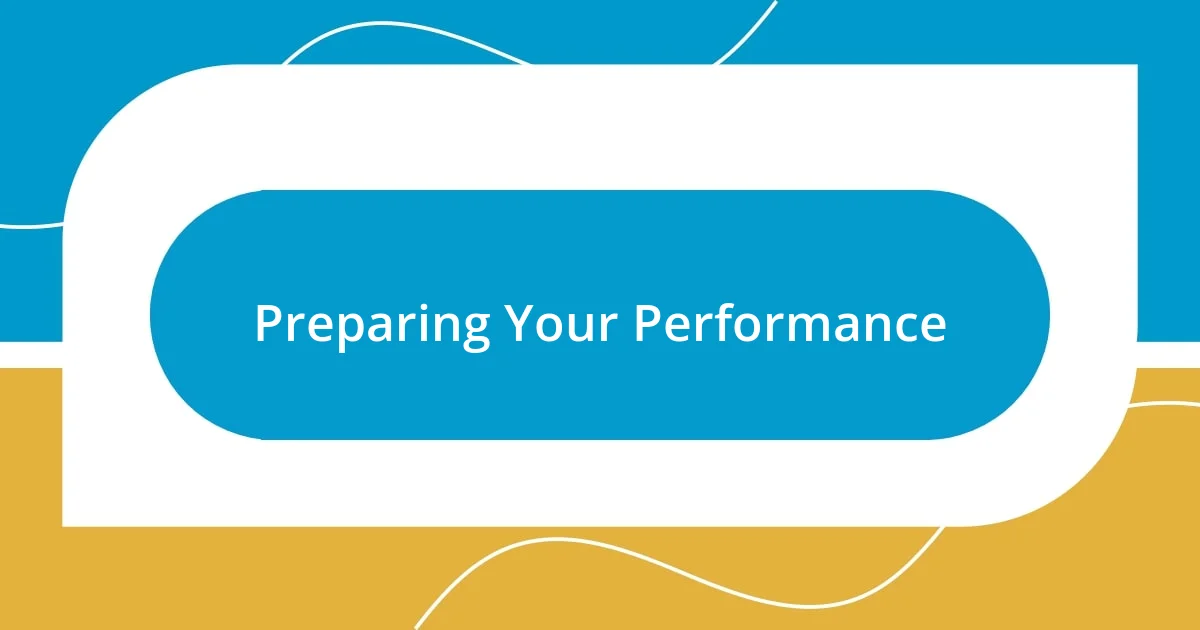
Preparing Your Performance
Preparing for an open mic night can be both thrilling and nerve-wracking. The key is to practice, practice, practice. During my early days of performing, I remember spending countless hours rehearsing in front of my mirror, imagining the audience’s reactions. This not only helped me refine my performance but also built my confidence over time. How do you think practice makes a difference in your own presentations? I truly believe it transforms uncertainty into assurance.
Another crucial aspect is selecting the right material. Early on, I learned that choosing pieces that resonate personally can elevate your performance. For instance, I once shared a poem about my journey through heartbreak, and you could feel the connection in the audience’s response. It’s like holding up a mirror for them to see their own experiences. So, when preparing your set, think about what strikes a chord in your heart. What stories do you want to tell, and how can they relate to others?
Lastly, I find that visualizing the performance can significantly impact how I feel when I step on stage. On a particularly anxious night, I closed my eyes and pictured my favorite supportive faces in the audience, which calmed my nerves. Have you ever tried visualization techniques before an important event? It can turn the anticipation from anxiety into excitement, and that’s a game-changer.
| Preparation Element | Personal Experience |
|---|---|
| Practice | Rehearsing in front of my mirror helped build my confidence. |
| Material Selection | Choosing real, heartfelt pieces creates genuine connections with the audience. |
| Visualization | Picturing supportive faces calms nerves and transforms anxiety into excitement. |
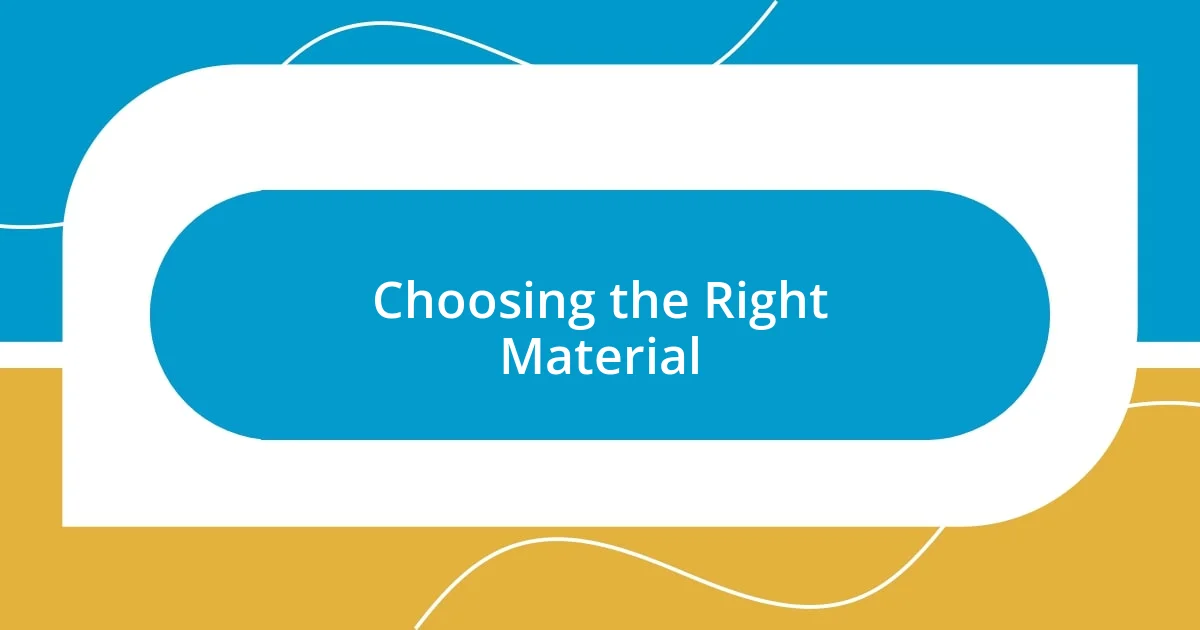
Choosing the Right Material
When it comes to choosing the right material for an open mic night, I like to focus on authenticity. There’s something magical about sharing pieces that reflect my true experiences or feelings. One night, I took a leap and performed a quirky story about my dog’s misadventures. The laughter that erupted was infectious, and it reminded me just how important it is to select material that not only showcases my personality but also engages the audience. If you can make them laugh or think deeply, you’ve already succeeded.
Here are some factors to consider when choosing your material:
- Resonance: Pick pieces that deeply resonate with you—your emotions will translate to the audience.
- Audience Connection: Consider your audience; tailor your material to what might engage or entertain them.
- Personal Experience: Use stories or poems that draw from your life; it creates relatability and authenticity.
- Variety: Mix humor with heartfelt moments to maintain a dynamic performance.
I’ve noticed that the balance between humor and emotion keeps the audience attentive. I remember one performance where I started with a funny tale about my first open mic disaster. The laughter loosened everyone up, and as I transitioned into a more serious reflection on overcoming fear, I could feel the room shift. This blend of tones not only holds interest but also elevates the overall experience for everyone involved.
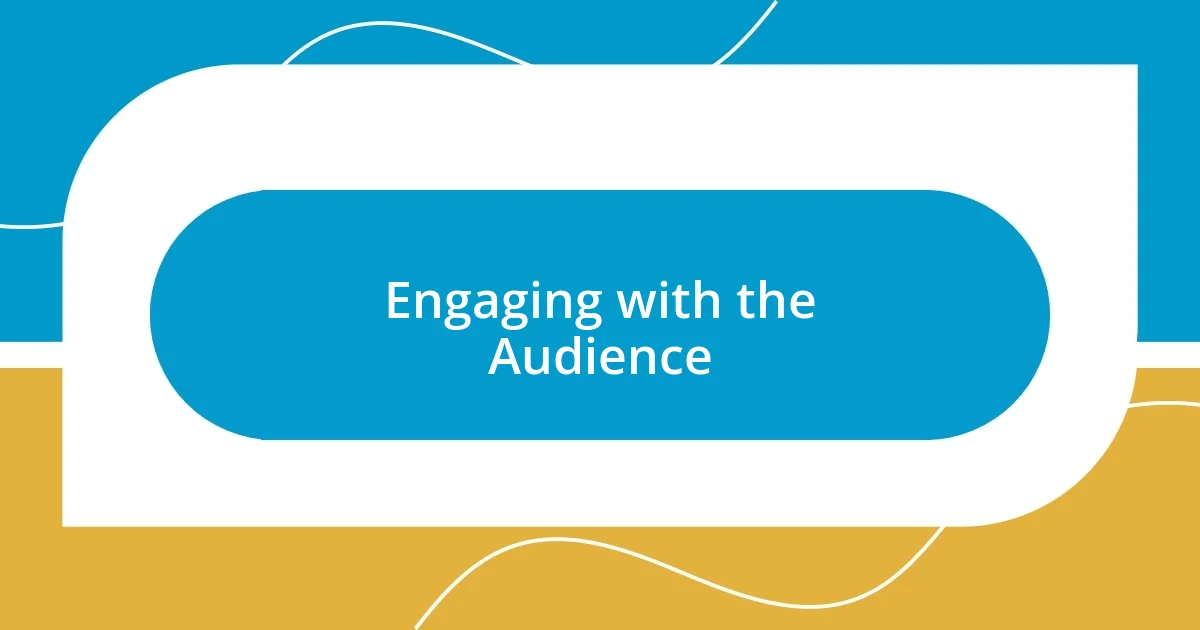
Engaging with the Audience
Engaging with the audience is like establishing a connection that can transform the atmosphere of your performance. I recall a night when I asked everyone to shout out their favorite song before I started my set. The energy in the room shifted instantly, and I could feel the buzz of excitement. This simple interaction not only broke the ice but also made the audience feel involved, turning them from passive observers into active participants.
I find that reading the room is essential. There have been times when I sensed a lull and instinctively changed my approach. For example, one evening, I pivoted from a serious piece to a light-hearted anecdote about my cooking disasters. The laughter that followed was like a breath of fresh air, and I could feel the audience leaning in, eager for the next moment. How do you adapt your performance based on the audience’s reactions? It’s fascinating how a little flexibility can create a more vibrant connection.
Sharing genuine moments is another way to engage your audience deeply. I remember a performance where, while telling a story, I shared a vulnerable experience about losing a loved one. The silence that enveloped the room felt heavy with empathy, and I could see tears glistening in some eyes. That moment solidified the bond between me and the audience. Have you ever felt that raw connection? It’s a reminder that behind every laugh and tear is a shared human experience, and embracing that can make your performance unforgettable.
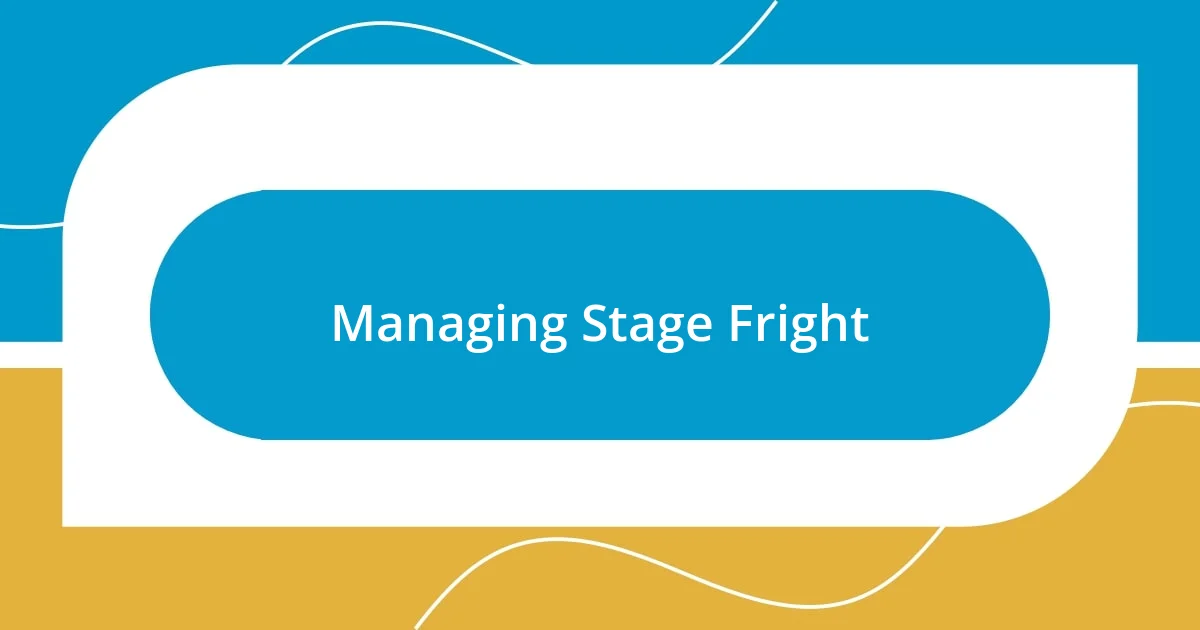
Managing Stage Fright
Managing stage fright is an intriguing part of the performance experience. I often combat those jitters by focusing on my breathing—taking deep, intentional breaths can really ground me. One particular open mic night, I felt the usual wave of nerves crash over me, but I paused for a moment, closed my eyes, and concentrated on my breath. It was remarkable how that brief act of mindfulness transformed my energy.
Another trick I’ve found effective is visualizing success. Before stepping on stage, I imagine the audience smiling and reacting positively to my performance. It sounds a bit whimsical, but I recall one time when I tried it before reciting a poem that meant a lot to me. The visualization made me feel as though I was sharing a moment with friends rather than standing before a crowd of strangers, which significantly calmed my nerves.
Lastly, I believe practice is key. The more I rehearse, the more confidence I feel. I remember stumbling through a new piece during practice, but after repeated runs, I could perform it smoothly. Have you ever noticed how familiar it feels to stand in front of a crowd once you know your material inside and out? Each successful performance builds on the last, creating a cycle of increasing confidence that can quiet that nagging fear.
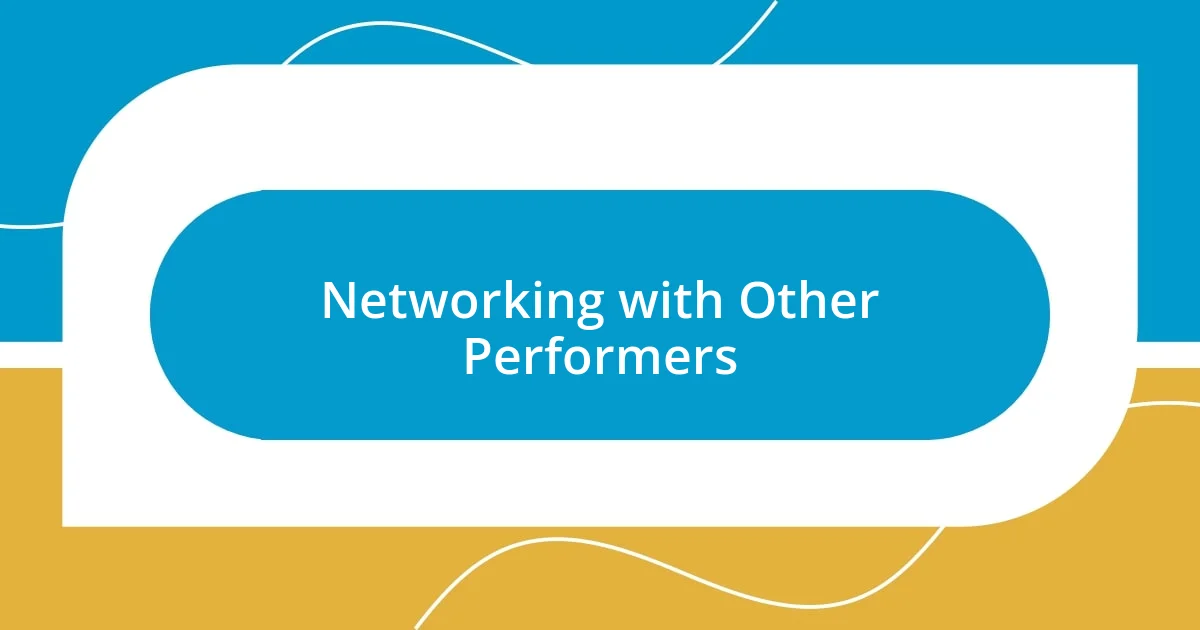
Networking with Other Performers
Building connections with other performers at open mic nights can be a treasure trove of opportunities. I remember the first time I reached out to a fellow musician after a show; we exchanged contacts and ended up collaborating on a track that wouldn’t have existed otherwise. Have you ever thought about how a simple conversation can bloom into something beautiful?
The camaraderie among performers is something I cherish. After a night of sharing our sets, I often find myself chatting with others over a drink, discussing everything from songwriting techniques to the best local venues. There’s a unique understanding that flows between artists; we share the same struggles and victories. Doesn’t it feel good to be part of a community that truly gets you?
I’ve also found that attending other performers’ sets can foster authentic connections. One evening, I went to support a poet I admired, and she ended up inviting me to a themed showcase. That experience not only opened doors to showcase my work but also introduced me to a supportive network of artists. How often do you take the time to support others? It’s amazing how investing in others’ journeys can lead to unexpected rewards, both personally and professionally.
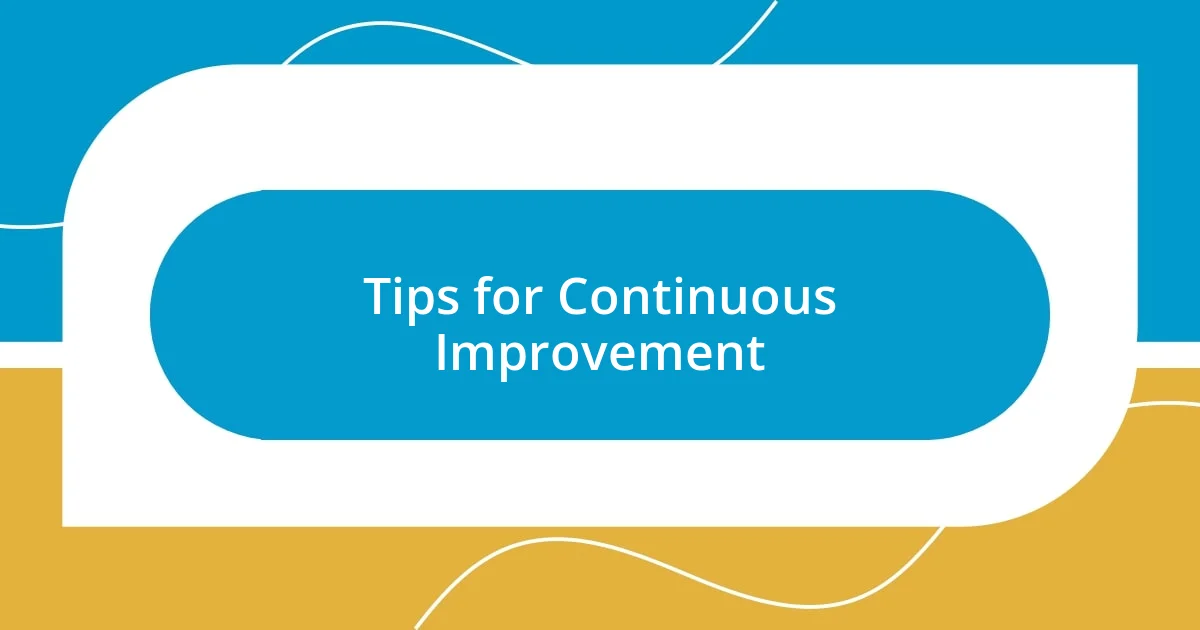
Tips for Continuous Improvement
Continuous improvement is all about embracing each experience and learning from it. One approach that has helped me is self-reflection after every performance. I take some time to jot down what worked and what didn’t. For instance, after my last set, I realized that my pacing seemed rushed. It was a small observation, but it made a significant difference in how I approached my next performance.
Another key element is setting small, achievable goals for each open mic night. I once aimed to experiment with a new style of delivery during a reading, and while it was nerve-wracking, it forced me to step outside my comfort zone. Engaging with the audience more visually and using my body language made an impact I hadn’t anticipated. Have you ever tried setting a specific focus for your performance? It can turn a routine night into a canvas for growth.
Finally, seeking feedback from others is invaluable. I often ask fellow performers for their thoughts on my set, and I value their honesty. One night, a fellow poet mentioned that my tone could convey more emotion. That suggestion stuck with me. Since then, I’ve worked on infusing my readings with deeper feelings, and it’s been transformative. What do you do to gather insights from your audience? Opening yourself to constructive criticism is a powerful way to evolve in this journey.

